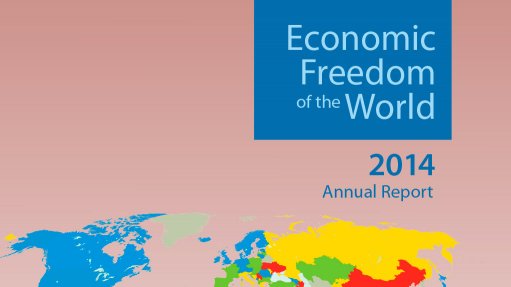
South Africa ranks 93 out of 151 countries and Hong Kong included in the Economic Freedom of the World: 2014 Annual Report, released today by the Free Market Foundation.
Last year, South Africa ranked 89.
From a ranking of 41 in 2000 (among the top 40% of countries measured), South Africa has, in just over a decade, slid down the rankings into the bottom 40%. The country’s score of 6.73 out of 10 is below the average economic freedom score.
Mauritius is the most economically free country in the SADC. Ranked 20 in 2000 with an economic freedom score of 7.60, Mauritius has advanced up to a ranking of 5 with a score of 8.09, after Hong Kong which once again topped the rankings at 8.98, followed by Singapore 8.54, New Zealand 8.25 and Switzerland 8.19. This improvement was no accident. The Mauritius government, after wide consultation with the general public, embarked upon reforms to free up the economy and make the country attractive for investment by local and international investors. The programme has been spectacularly successful, with a high level of economic growth and a rapid increase in per capita incomes. An approach that is certainly worth emulating.
Globally, the average economic freedom score dropped slightly to 6.84 out of 10 from 6.87 last year.
The United States, once considered a bastion of economic freedom, now ranks 12th in the world, tied with the United Kingdom. Due to a weakening rule of law, increasing regulation, and the ramifications of wars on terrorism and drugs, the United States has seen its economic freedom score plummet in recent years, compared to 2000 when it ranked second globally.
Once again, Venezuela has the lowest level of economic freedom worldwide, with the Republic of Congo, Zimbabwe, Argentina and Algeria rounding out the bottom five countries. Some despotic countries such as North Korea and Cuba could not be ranked due to lack of data.
According to fact-based research in top peer-reviewed journals, people living in countries with high levels of economic freedom enjoy greater prosperity, more political and civil liberties, and longer life spans. The cornerstones of economic freedom include personal choice, voluntary exchange, freedom to compete, and security of private property.
“The link between economic freedom and prosperity is undeniable. The most economically free countries offer the highest quality of life and personal freedoms while the lowest-ranked countries are usually burdened by oppressive regimes that limit the freedom and opportunity of their citizens,” said Fred McMahon, who holds a Research Chair in Economic Freedom with the Fraser Institute, Canada.
“Hong Kong’s number one rating based on 2012 data and the ongoing protests this year highlight how much HK stands to lose if the rule of law or fair treatment of all is undermined,” McMahon added. “This is threatened by encroaching mainland Chinese influence in Hong Kong’s legal system and attempts to impose government control on judges and their decisions—potentially turning the rule of law into a political instrument. This is an attack on Hong Kong’s future prosperity and international standing.”
Countries in the top quartile of economic freedom had an average per capita GDP of US$39,899 in 2012, compared to US$6,253 for bottom quartile nations.
Moreover, the average income of the poorest 10 per cent in the most economically free countries in 2012, US$11,610, was almost double the overall average income in the least free countries. And life expectancy is 79.9 years in the top quartile compared to 63.2 years in the bottom quartile.
The Fraser Institute produces the annual Economic Freedom of the World report in co-operation with the Economic Freedom Network, a group of independent research and educational institutes in nearly 90 nations and territories. It’s the world’s premier measurement of economic freedom, using 42 distinct variables to create an index, ranking countries based on economic freedom, which is measured in five areas: size of government, legal structure and security of property rights, access to sound money, freedom to trade internationally, and regulation of credit, labour and business. Download the full report above and at www.freetheworld.com.